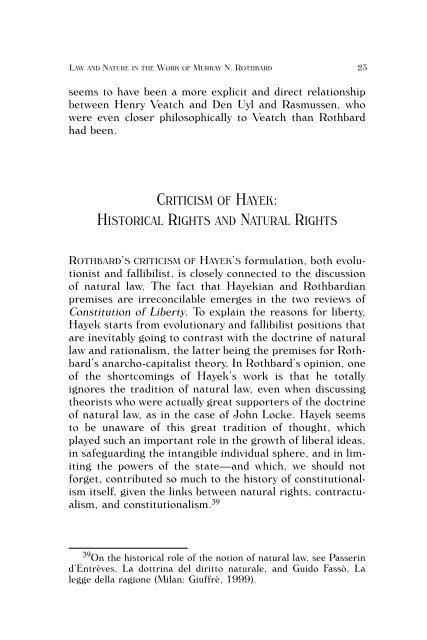Murray N. Rothbard vs. the Philosophers - Ludwig von Mises Institute
Murray N. Rothbard vs. the Philosophers - Ludwig von Mises Institute
Murray N. Rothbard vs. the Philosophers - Ludwig von Mises Institute
You also want an ePaper? Increase the reach of your titles
YUMPU automatically turns print PDFs into web optimized ePapers that Google loves.
LAW AND NATURE IN THE WORK OF MURRAY N. ROTHBARD 23<br />
seems to have been a more explicit and direct relationship<br />
between Henry Veatch and Den Uyl and Rasmussen, who<br />
were even closer philosophically to Veatch than <strong>Rothbard</strong><br />
had been.<br />
CRITICISM OF HAYEK:<br />
HISTORICAL RIGHTS AND NATURAL RIGHTS<br />
ROTHBARD’S CRITICISM OF HAYEK’S formulation, both evolutionist<br />
and fallibilist, is closely connected to <strong>the</strong> discussion<br />
of natural law. The fact that Hayekian and <strong>Rothbard</strong>ian<br />
premises are irreconcilable emerges in <strong>the</strong> two reviews of<br />
Constitution of Liberty. To explain <strong>the</strong> reasons for liberty,<br />
Hayek starts from evolutionary and fallibilist positions that<br />
are inevitably going to contrast with <strong>the</strong> doctrine of natural<br />
law and rationalism, <strong>the</strong> latter being <strong>the</strong> premises for <strong>Rothbard</strong>’s<br />
anarcho-capitalist <strong>the</strong>ory. In <strong>Rothbard</strong>’s opinion, one<br />
of <strong>the</strong> shortcomings of Hayek’s work is that he totally<br />
ignores <strong>the</strong> tradition of natural law, even when discussing<br />
<strong>the</strong>orists who were actually great supporters of <strong>the</strong> doctrine<br />
of natural law, as in <strong>the</strong> case of John Locke. Hayek seems<br />
to be unaware of this great tradition of thought, which<br />
played such an important role in <strong>the</strong> growth of liberal ideas,<br />
in safeguarding <strong>the</strong> intangible individual sphere, and in limiting<br />
<strong>the</strong> powers of <strong>the</strong> state—and which, we should not<br />
forget, contributed so much to <strong>the</strong> history of constitutionalism<br />
itself, given <strong>the</strong> links between natural rights, contractualism,<br />
and constitutionalism. 39<br />
39 On <strong>the</strong> historical role of <strong>the</strong> notion of natural law, see Passerin<br />
d’Entrèves, La dottrina del diritto naturale, and Guido Fassò, La<br />
legge della ragione (Milan: Giuffrè, 1999).


